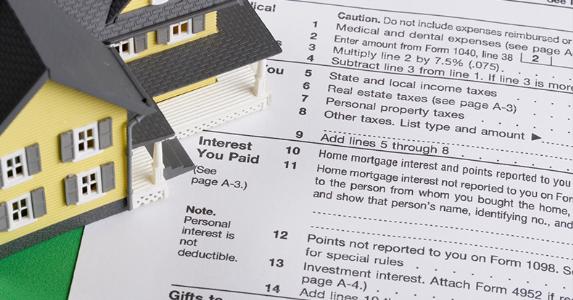The Plain English Guide To Homeowner Tax Benefits
 When tax season comes around each year, many homeowners look forward to their tax benefits. Unfortunately, many do not know how to calculate their benefits, therefore, they follow the steps that are outlined on online tax programs, or they trust that the person preparing their taxes will figure it out. It is a good idea that homeowners understand how their tax benefits work in language that they can understand. So let’s talk taxes!
When tax season comes around each year, many homeowners look forward to their tax benefits. Unfortunately, many do not know how to calculate their benefits, therefore, they follow the steps that are outlined on online tax programs, or they trust that the person preparing their taxes will figure it out. It is a good idea that homeowners understand how their tax benefits work in language that they can understand. So let’s talk taxes!
Primary Residence Ownership Costs
When you own a home, your monthly payments are made up of the principal, interest, taxes, and insurance, also known as P.I.T.I. With each payment you make, your principal pays down your loan, and the interest goes to your lender. The taxes that you pay are your local property taxes. These are assessed by your county or city, and are paid annually, semi-annually, or quarterly. The insurance refers to the money that you pay to an insurance company to protect your home in case of fire, flood, or other type of disaster.
There is a certain formula that would help you break down your housing cost. For example, if you bought a home that cost 300,000, and if you put 20 percent down, and got a 30 year loan with a fixed rate of 3.5 percent, your housing cost would be broken down as follows
Your monthly mortgage payment, including the principal and interest would be 1,077.
Your property taxes would be 300, based on the U.S average of 1.2 percent
Your homeowner’s insurance would be 75
The total cost would be 1,452
Annual Tax Benefits For Primary Residence Owners
When you own your home, you can get a tax benefit by deducting the mortgage interest and property tax that you pay each year. For example
On the total monthly mortgage payment of 1,077, 700 would go toward the interest and 377 goes toward paying down the loan. Also, 300 per month would go to the property taxes. When you calculate your interest payments by the year, you would be paying 8,400, and 3,600 in property taxes. When you total the two, the amount would be 12,000. This is the total amount that you can deduct when you file for your taxes, as long as you are a low to moderate income homeowner.
How Does a Tax Deduction Help Save You Money?
When you file your taxes every year, you would fill out a Schedule A form. This is where you would list the items that you be deducted from your total income, so that you can pay taxes on a lower income. The are lines on this form where you can list your property tax and mortgage interest deductions. In the example used in this article, the IRS would allow you to itemize the 8,400 mortgage interest and 3,600 into their respective line items on Schedule A. When you do this, 12,000 would be taken from the annual income that you would need to pay taxes on.
For example, if you W-2 form shows that you made 90,000 this year, you would subtract the 12,000 from your gross income, therefore, the amount of money that you would be taxed on would be reduced to 78,000. At the 90,000 per year level of income, you would be taxed about 28 percent. It is important to understand that different income amounts are taxed at different rates.
If you want to estimate how much money your tax deduction would save you in the quickest, easiest way, you should multiply the 12,000 that you had in total deductions by the 28 percent tax rate. In the end, you would be saving yourself 3,360 in tax payments. If you covert this amount into a monthly amount of 280, and you subtract it from your total monthly housing costs of 1,482, after your annual tax benefits, your monthly cost housing cost would be reduced to 1,172 after your tax benefits. This would make a 300,000 home, affordable, and much cheaper than renting a comparable home.
Additional Tax Benefits for Homeowners
There are other annual tax benefits available to homeowners. These include
Home energy credits
Points paid on a mortgage refinance
Low earners can deduct mortgage insurance
Home office deductions
Each of these additional benefits have stipulations, therefore you should read the fine print and discuss it with your financial adviser.
If you sell your primary residence during this tax year, you can get additional benefits. If you are single, you would be exempt from paying capital gain on taxes of up to 250,000 in capital gains. The exemption would increase to 500,000 for married couples. You can also use any money that you spent on home improvements when you own the home to reduce your taxable gain.
The guidelines above apply only to primary residence owners, and most of them apply to second home owners. In order to understand the variations for second homes, you should contact a tax professional. If your second home is a rental property, you should review the guide to tax benefits for rental properties.
All tax matters, including homeowner deductions, benefits change based on your individual profiele, therefore, you should consult a tax professional regarding the benefits.